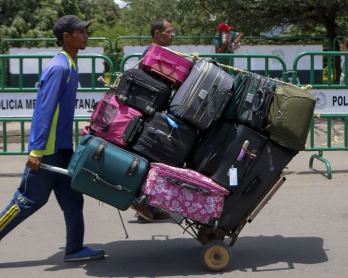Fleeing home in time of peace
Huaquillas, Ecuador -- Covering the Venezuelan refugee crisis has been extremely personal for me. I am from Cucuta, a Colombian city right on the border, so my life has always been a back and forth between the two countries. I would go to Venezuela to visit friends, or to take a walk, to eat good food, to enjoy its Caribbean shoreline. So this story has really felt like my own.
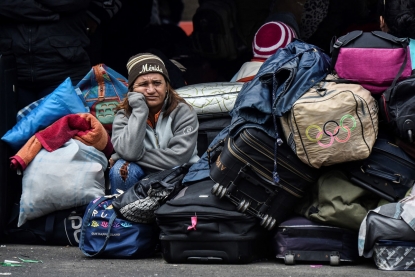 A Venezuelan woman waits outside the Colombian migration office near the Rumichaca international bridge, August 20, 2018.
(AFP / Luis Robayo)
A Venezuelan woman waits outside the Colombian migration office near the Rumichaca international bridge, August 20, 2018.
(AFP / Luis Robayo)We had been monitoring the situation of the Venezuelan migrants for weeks. This year, more and more of them have been leaving their country, where they can no longer afford to take care of their families, in search of jobs and a better future elsewhere in South America. They have tried to reach Ecuador, Peru, Chile. Thousands have settled in Colombia, where it has been fairly easy for them to get working papers.
Faced with the sudden exodus, several countries began to make it more difficult for Venezuelans to enter. Before, citizens of Bolivia, Colombia, Ecuador, Peru and Venezuela could travel between their nations without a passport. But now countries were starting to impose passport controls. When Ecuador announced that it would start requiring Venezuelans to have the documents, we decided to move as quickly as possible because we knew there would be a rush to beat the deadline.
 A Venezuelan migrant woman heading to Peru carries bags as she walks along the Pan American highway in Tulcan, Ecuador, after crossing from Colombia, on August 21, 2018.
(AFP / Luis Robayo)
A Venezuelan migrant woman heading to Peru carries bags as she walks along the Pan American highway in Tulcan, Ecuador, after crossing from Colombia, on August 21, 2018.
(AFP / Luis Robayo)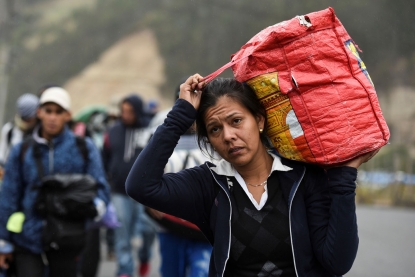 A Venezuelan migrant woman heading to Peru carries a bag as she walks along the Pan American highway in Tulcan, Ecuador, after crossing from Colombia, on August 21, 2018.
(AFP / Luis Robayo)
A Venezuelan migrant woman heading to Peru carries a bag as she walks along the Pan American highway in Tulcan, Ecuador, after crossing from Colombia, on August 21, 2018.
(AFP / Luis Robayo)
I learned that scores of Venezuelans were arriving at the border of Colombia and Ecuador, following Quito’s clampdown, early on Sunday, August 19, when my bosses called me. I got together my equipment, some clothes and took off for the airport to fly to the city of Pasto, which was about two hours’ drive from the border crossing between Colombia and Ecuador where we knew Venezuelan migrants would be heading. I got to Pasto around 4 pm and headed by car to the Rumichaca border bridge.
Along the way, I started to see small groups of people walking along the road with suitcases. I followed them for a while, taking pictures, and then continued my way to the border.
When I arrived in Rumichaca, I saw dozens of people standing in line to the Migration Office. Some wrapped themselves in blankets, others were sleeping together in tents. There were adults, women, the elderly, children. They were all hoping to enter Ecuador, which has become much more difficult because they now needed a passport.
I took pictures and rushed to the town of Ipiales to find a hotel where I could send my photos and spend the night.
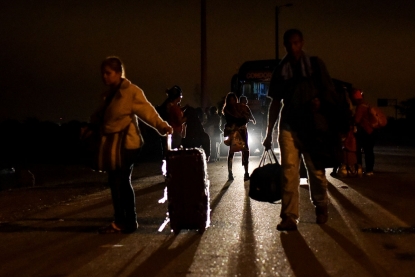 Venezuelan migrants cross the border between Ecuador and Peru in Tumbes, Peru, on August 25, 2018.
(AFP / Luis Robayo)
Venezuelan migrants cross the border between Ecuador and Peru in Tumbes, Peru, on August 25, 2018.
(AFP / Luis Robayo)The next morning, the situation at Rumichaca was more hectic as people kept arriving. NGOs had begun to arrange some tents and mattresses for the women and children. During the day, some locals came in cars to offer the Venezuelans coffee and bread -- one of the many acts of kindness by locals that I would see during my week of reporting.
By the end of the day, some 700 people had decided that with the door to Ecuador shut, they would head to Peru, which was the final destination for many of them. Peru had said it would impose passport controls as of August 24, so it became a race against time. The temperatures at night had begun to drop -- a very chilly 3 degrees Celsius. Many of the migrants hadn’t eaten. But local residents, both Colombians and Ecuadorians, had driven to offer hot coffee, tea, food, blankets, mattresses.
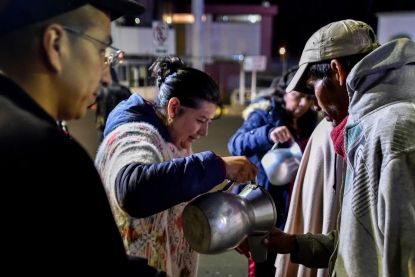 Colombians offer food to Venezuelan migrants waiting outside the Ecuadorean migration office at the Rumichaca international bridge in Tulcan, Ecuador, August 20, 2018.
(AFP / Luis Robayo)
Colombians offer food to Venezuelan migrants waiting outside the Ecuadorean migration office at the Rumichaca international bridge in Tulcan, Ecuador, August 20, 2018.
(AFP / Luis Robayo)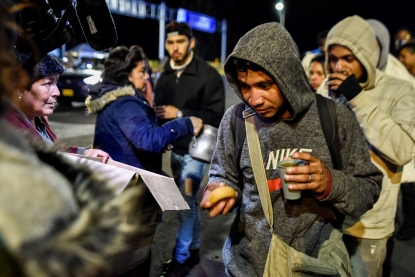 Colombians offer food to Venezuelan migrants waiting outside the Ecuadorean migration office at the Rumichaca international bridge in Tulcan, Ecuador, August 20, 2018.
(AFP / Luis Robayo)
Colombians offer food to Venezuelan migrants waiting outside the Ecuadorean migration office at the Rumichaca international bridge in Tulcan, Ecuador, August 20, 2018.
(AFP / Luis Robayo)
When I returned to the bridge at 6 am the next morning, most of the migrants were already ready for the long walk ahead. I climbed up the road to get a bird’s eye view. I couldn’t believe it -- hundreds of people walking with their suitcases on the side of the highway.
One of the things that touched me most while covering this story were the children. Maybe because I’m a father myself, of my precious three-year-old girl, Martina. The migrants' children were so innocent, they had no idea how important this journey was. For them, everything is an adventure. They played and laughed as they would have anywhere. The adults just walked. I felt so sad and impotent.
I talked with my editors later in the day and we decided that I would follow the migrants. I walked with one group, taking pictures along the way. When they settled down for the night by the side of the road, I remained with them, taking photographs before settling down myself.
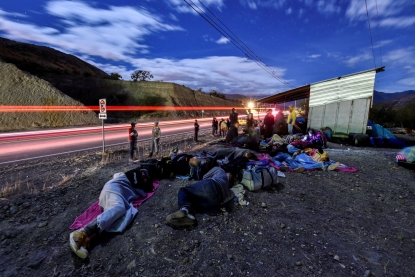 Venezuelan migrants on their way to Peru sleep along the Pan-American Highway between Tulcan and Ibarra in Ecuador, after entering the country from Colombia, on August 22, 2018.
(AFP / Luis Robayo)
Venezuelan migrants on their way to Peru sleep along the Pan-American Highway between Tulcan and Ibarra in Ecuador, after entering the country from Colombia, on August 22, 2018.
(AFP / Luis Robayo)I tried to fall asleep, but couldn’t. I kept thinking about these people. These could be my friends, my family. I kept thinking of my three-year-old daughter. She could be one of the children walking along the highway.
At 5 am word rippled through that several buses would come to take the migrants to Quito and then to Huaquillas, an Ecuadorian city on the border with Peru. I saw them off, boarding buses with smiles on their faces, and decided to go back to Colombia to wait for a text and video colleague. We were aiming to follow a single group of Venezuelans just arriving at the border headed for Peru.
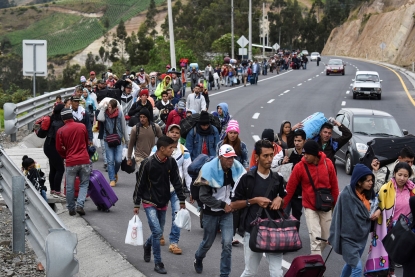 Venezuelan migrants heading to Peru walk along the Pan American highway in Tulcan, Ecuador, after crossing from Colombia, on August 21, 2018.
(AFP / Luis Robayo)
Venezuelan migrants heading to Peru walk along the Pan American highway in Tulcan, Ecuador, after crossing from Colombia, on August 21, 2018.
(AFP / Luis Robayo)
My colleagues Rodrigo Almonacid, a text journalist, and Juan Restrepo, a video reporter, arrived very early the next day and we headed out to the Pan-American Highway. A few kilometers from Pasto we saw a van with some people in the back -- two families who met on the road and decided to join forces and travel together. The Lomellys were heading to Quito and the Mendoza Landinez clan was heading to Peru.
We decided to follow them.
They drove until a Colombian police checkpoint, where officers order them out saying it was too risky to travel in the back of the truck.
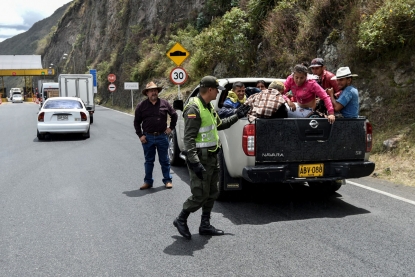 A truck is stopped on the Pan-American Highway between Pasto and Ipiales, Colombia, on August 23, 2018.
(AFP / Luis Robayo)
A truck is stopped on the Pan-American Highway between Pasto and Ipiales, Colombia, on August 23, 2018.
(AFP / Luis Robayo)They walked out of sight of the police and the truck returned to pick them up. Everyone got in again and drove for a few kilometers more. The truck driver couldn’t go any further, so everyone got out to walk -- 11 people and a five-month-old baby. With their suitcases.
The families were famished and luckily, a guardian angel appeared on the side of the road. A Venezuelan woman who had arrived here a few weeks ago and who now worked at a roadside restaurant not far away. When she saw the two families, she started crying because they reminded her of when she got here. She handed them food and the two families shared the meal.
A few minutes later, another lucky break. A truck stopped. The driver was on his way to Ipiales and could give them a lift to there. Everyone quickly threw in their suitcases and got inside. In Ipiales, they began the walk to the border.
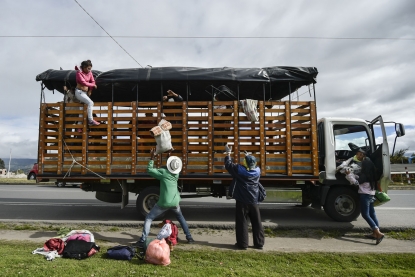 Members of Venezuelan migrant families Mendoza Landinez and Lomelly get off a truck on the Pan-American highway, between Pasto and Ipiales in Colombia, on their way to Peru, on August 23, 2018.
(AFP / Luis Robayo)
Members of Venezuelan migrant families Mendoza Landinez and Lomelly get off a truck on the Pan-American highway, between Pasto and Ipiales in Colombia, on their way to Peru, on August 23, 2018.
(AFP / Luis Robayo)This was a really tough assignment physically. The days were long and strenuous, walking for hours and taking pictures. I would go ahead, wait for the migrants to pass, then run ahead of them again. And it was exhausting emotionally too, because I had to keep reminding myself not to get angry at the situation and just concentrate on taking good photos.
After several hours, we finally arrived at the border. Some more good news -- as a humanitarian gesture, Ecuador was going to provide buses to take the migrants to the border with Peru. They waited in the frigid cold -- 4 degrees Celsius -- for several hours. Then the Mendoza Landinez family got some bad news -- 19-year-old Eliana would not be able to get on the bus because her identity card was mangled and the migration officials thought it was a fake. She and her five-month-old baby Tiago would stay behind.
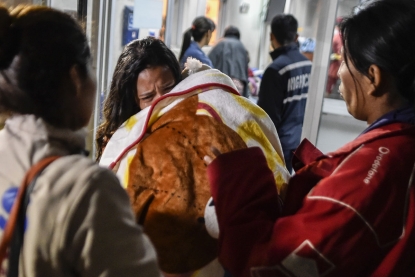 Eliana Balza, 19, (C) cries as she holds her baby Tiago, after the Ecuadoran authorities banned her from entering the country, at the Ecuadoran migrations office at the Rumichaca International Bridge, on August 24, 2018.
(AFP / Luis Robayo)
Eliana Balza, 19, (C) cries as she holds her baby Tiago, after the Ecuadoran authorities banned her from entering the country, at the Ecuadoran migrations office at the Rumichaca International Bridge, on August 24, 2018.
(AFP / Luis Robayo)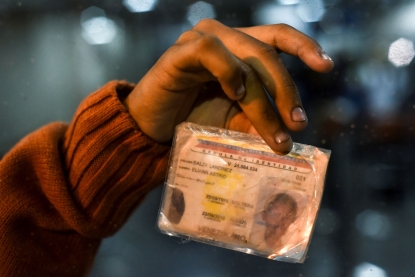 Eliana Balza, 19, shows her damaged Venezuelan identity card, after the Ecuadoran authorities banned her from entering the country, at the Ecuadoran migrations office at the Rumichaca International Bridge on August 24, 2018.
(AFP / Luis Robayo)
Eliana Balza, 19, shows her damaged Venezuelan identity card, after the Ecuadoran authorities banned her from entering the country, at the Ecuadoran migrations office at the Rumichaca International Bridge on August 24, 2018.
(AFP / Luis Robayo)
It was heart-wrenching watching them make the decision. If they stayed with Eliana, the whole family would miss the deadline to cross into Peru. So Eliana and her baby would head to Quito, with the Lomellys. The rest of the family got on the bus to the border with Peru. We hurried to hire a driver to follow them.
The bus drove the 670 kilometers to the border town of Huaquillas, making stops along the way. It got there at 4 am on August 25. They had missed the deadline by four hours. The faces of the Venezuelans were a mix of rage and impotence. That’s how I felt on the inside.
Not having passports, the Mendoza Landinez decided to ask to enter Peru as refugees. They got in line. Eventually, their request was approved and they entered the country as refugees and headed to Lima, to meet Eliana’s Mom.
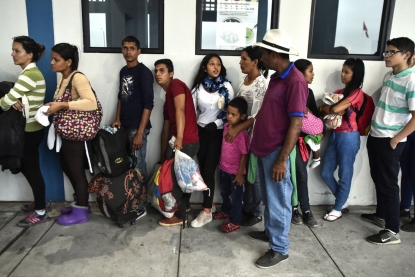 Members of the Mendoza Landinez family wait in line to apply for refugee status, outside the Peruvian immigration offices, in Tumbes, Peru, on August 25, 2018.
(AFP / Luis Robayo)
Members of the Mendoza Landinez family wait in line to apply for refugee status, outside the Peruvian immigration offices, in Tumbes, Peru, on August 25, 2018.
(AFP / Luis Robayo)By this time, it had been nearly 40 hours without sleep, so exhausted, we decided to look for a hotel to rest.
I loved covering this story, but it was so sad to see -- all these people, despite the inconveniences, the risks, they leave everything in their country to look for a better future elsewhere. Many of them are professionals whose salaries are not enough to feed their families.
I have covered conflict before and plenty of refugees that those conflicts produced. I would arrive in a town and find it empty. But Venezuela is not a country at war. Its people are leaving the country because of economic necessity -- there is a shortage of medicine, they can’t buy food for their families despite having a job and earning a salary. There is something really tragic in seeing people from a country at peace have to flee.
This blog was written with Yana Dlugy in Paris.
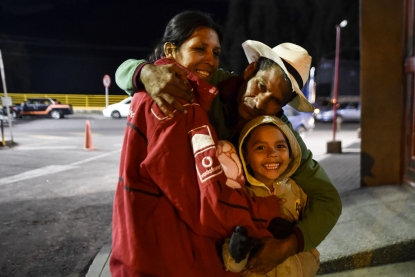 Joel Mendoza (C), 51, embraces his partner Edicth Landinez (L), 34, and her son Sebastian, 6, outside the Colombian migrations office at the Rumichaca International Bridge, in the border between Ipiales, Colombia, and Tulcan, Ecuador, on August 23, 2018, after obtaining the Andean migration card (TAM).
(AFP / Luis Robayo)
Joel Mendoza (C), 51, embraces his partner Edicth Landinez (L), 34, and her son Sebastian, 6, outside the Colombian migrations office at the Rumichaca International Bridge, in the border between Ipiales, Colombia, and Tulcan, Ecuador, on August 23, 2018, after obtaining the Andean migration card (TAM).
(AFP / Luis Robayo)



